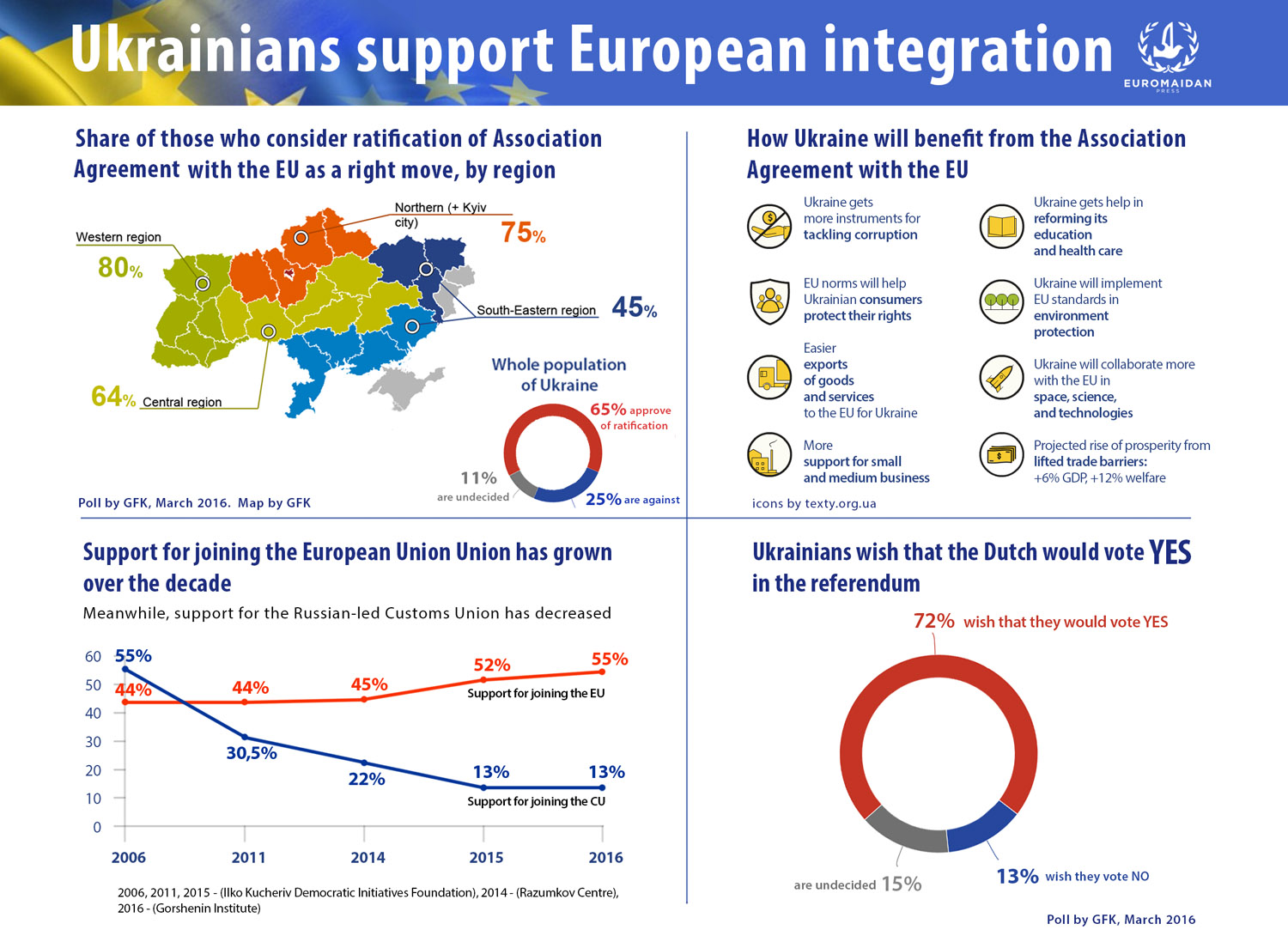One of the factors that unite Ukrainians nowadays is their ambition for eurointegration. The best example of Ukraine's struggle for European values, namely, democracy, rule of law, and human rights was Euromaidan. The decision by president Yanukovych not to sign the Association Agreement gave impulse for the Euromaidan revolution that united different regions of Ukraine and different segments of population. Ukrainians chose their European future.
Support of the European vector in numbers
Due to its Soviet past, Ukrainians were not always unanimous about the European vector of development. According to social surveys conducted by the Ilko Kucheriv Democratic Initiatives Foundation in 2006 43,7% of Ukrainians thought that the country needs to join the European Union, while 35,9% said “тo” to the EU. At the same time, 55,3% of people supported the idea of joining the Customі Union with Russian Federation, Belorus, and Kazakhstan, and only 22,7% were against it. However, during the last decade the situation has changed dramatically.
In 2011, the level of support of the European vector was the same, while only 30,5% of Ukrainians supported joining the Custom Union. In March 2014, right after the Euromaidan revolution, 45,3% of people supported the EU direction of development, and only 21,6% supported joining the Customs Union. One year after the beginning of Russia`s aggression against Ukraine, even more Ukrainians ascertained the need of the eurointegration, and more Ukrainians lost their illusions about the Customs Union, namely 52% of eurosupporters against 13% supporters of the Customs Union, according to the data by the Sociological service of the Razumkov Center.
According to the survey by the Ilko Kucheriv Democratic Initiatives Foundation held in summer 2015, the majority of the Ukrainian population (57%) is convinced that eurontegration is in the interests of Ukraine. Unsurprisingly, Ukraine’s western region (83%) supports the eurointegration vector the most, while the population of Donbas supports it the least (39%).
53% of citizens sees interest of the European Union itself in deepening its relation with Ukraine. In the opinion of 40% of Ukrainians, the European Union understands the needs of Ukraine, while 32% say the opposite. 51% of the population of Ukraine believed that deepening bilateral relationі with the EU does not pose a threat to the development of Ukrainian culture. Additionally, 56% of Ukrainians believed that coordinating closer relations with the EU is important for the successful economic development of Ukraine.
During the named surveys there were no questions about the Association Agreement itself. However, support for the pro-European vector of development allows saying that the Association Agreement between Ukraine and the European Union will also be supported. A recent survey conducted by GFK in March 2016 showed that the majority of Ukrainians support the ratification of the EU-Ukraine Association Agreement: 64% of Ukrainians say that ratification of the Association Agreement between Ukraine and the EU was a right decision. Only 24% of respondents do not agree with this position. Even in the East and South of the country 45% of people support the Agreement, while 39% are against it. Moreover, 72% of Ukrainians appeal to the Dutch to vote “Yes” at the referendum in regard of the Association Agreement, while only 13% wish them to vote “No.” In Ukraine’s South-East, a smaller fraction supports a yes-vote but the result is still overwhelmingly positive: 57% of the respondents want The Netherlands’ support on the referendum and 21% are against a Yes-vote.
A previous survey conducted in October 2013, just before the Agreement had to be signed, by the Office of the Ukrainian research institute, IFAK, showed that 50% of Ukrainians supported the Agreement, while 33% did not.
These studies give reason to believe that the idea of European integration unites Ukraine like never before.
Previously pro-Russian East and South shifting to favor of EU
A survey held by the GfK Ukraine company in autumn 2015 in the South and East of Ukraine shows that 77% of the population of these regions want to build Europe in Ukraine. The residents of these areas have in mind the introduction of European standards and raising the living standards to European ones. The study showed a mostly positive attitude in the East and South of Ukraine towards the EU, namely 59%. The least positive attitude to the EU at 51% recorded in Donetsk and Luhansk oblasts (excluding occupied territories), and the most positive, namely at 71%, in Kherson oblast. However, only 29% of respondents believe that cooperation with the EU should be a priority of foreign policy of Ukraine, while 55% of respondents support the idea of neutrality in foreign policy.
Among the main arguments, why residents of the East and South of Ukraine support integration with the EU is the possibility of increasing living standards, wages and pensions to European level. They would also like to see Ukraine adopting European experience in the reform of medicine, transport, housing services and education. They are ready to accept the idea of European integration in those areas where they are experiencing problems in their daily lives. The reasons why the East and the South do not support rapprochement with the EU, are fear that it will lead to the decline of the Ukrainian economy due to non-competitiveness of Ukrainian goods in comparison with European ones.
Another survey by GfK Ukraine conducted in Kharkiv, the administrative center of oblast in eastern Ukraine, also shows more support for the European vector. 35% of Kharkiv residents have positive opinion for the EU while 22% have a negative one. When asked the same question about Russia, 31% answered that they have positive attitude, and 30% - a negative one.
Benefits of the Association Agreement with EU for Ukraine
One of the reasons for the high level of support of the European vector of integration in the recent years is caused by the more and more clear understanding how Ukraine can benefit from cooperation with the European Union. Among the benefits are new trading opportunities and easier access to the largest market in the world, but this is not the comprehensive list.
Every chapter of the Association Agreement is directed to the fight with corruption in the state and private sectors. The public finances sphere and planning of state budget will become more transparent. Small and medium business will benefit from easier procedures of exporting goods. Soviet standards and norms of manufacturing will be cancelled. Instead, modern European norms will be implemented, and safe production will not need certification at all. Consumers will also benefit from the new standards of manufacturing, because they will be able to buy goods of better quality.
Additionally, independent studies suggest that the simple implementation of the agreement would bring benefits of +6% of additional GDP over the medium run and +12% in terms of increased welfare for the Ukrainian people.
Among the other positive changes that the Association Agreement will bring to Ukraine is cooperation in the spheres of science, space, and information technologies, new standards for quality of air and water, and possibilities to decrease environment pollution, possibilities for better standards of medicine and education.
The EU-Ukraine Association Agreement also envisions an effective method of control over the Ukrainian authorities: the EU can suspend the Association Agreement in case human rights and freedoms or rule of law are endangered in the country. This will give civic society activists leverage on pressuring their authorities to conform to the requirements of EU integration.
The Association Agreement between Ukraine and European Union does not mean that Ukraine is joining the EU. The EU countries will not be forced to deal with Ukraine’s problems and to provide financial aid. The EU does provide financial aid to Ukraine, but the Association Agreement does not. It only means that Ukraine and the EU countries will have more possibilities for cooperation that will be beneficial for the both sides of the agreement. Ukrainians understand the benefits of the cooperation with the European Union, which is reflected in the high level of support of the European vector. Pro-European ideas unite Ukraine, and Ukrainians need support in their European ambitions.






